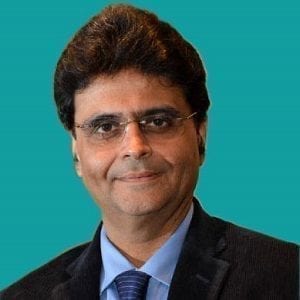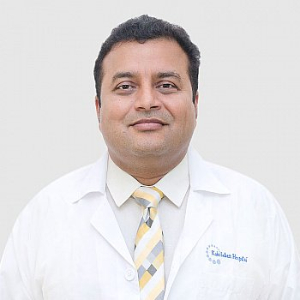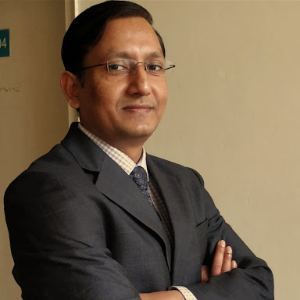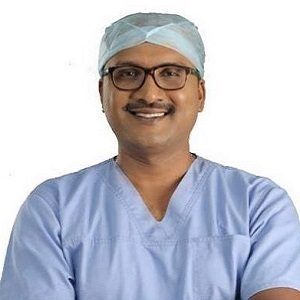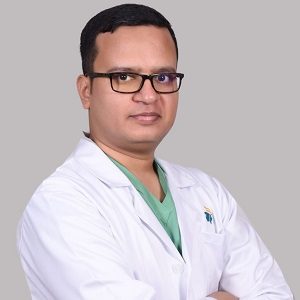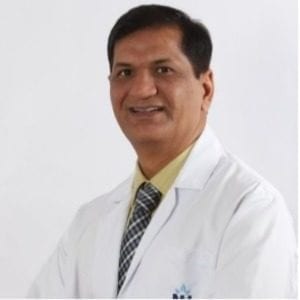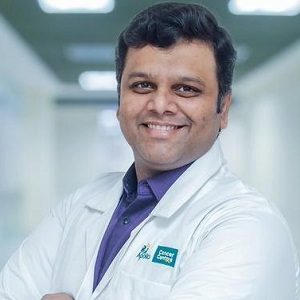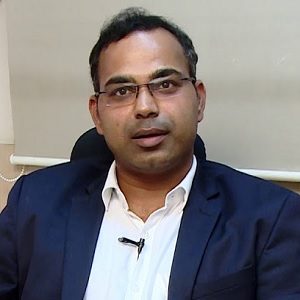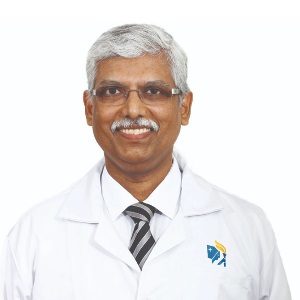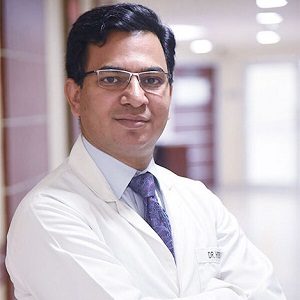Best Kyphoplasty Surgeons in India
- Orthopedic Surgeon & Spine Surgeon, Mumbai, India
- Over 25 years’ experience
Profile Highlights:
- Dr. Ram Chaddha is a specialist Spine Surgeon in Mumbai with expertise in the management and treatment of all kinds of spinal disorders for over 25 years.
- Dr. Chaddha is trained in Minimally Invasive Spine Surgery and is also among the few surgeons in India to hold expertise in Minimally Invasive Cosmetic Spine Surgery.
- Dr. Ram Chaddha spent a considerable number of years training undergraduate and postgraduate students and has also been an examiner for such courses at Mumbai University.
- Orthopedic Surgeon and Spine Surgeon, Mumbai, India
- Over 20 years’ experience
Profile Highlights:
- Dr. Vishal Peshattiwar is a leading Spine Surgeon in Mumbai specializing in Minimally Invasive Spine Surgeries (MISS)
- He has an experience of more than 2 decades in spine surgery and holds the credit of performing over 4000 spinal surgeries to
- He is the first in India to use the MISS technique on a patient with liver failure and Tuberculosis.
- Dr. Vishal Peshattiwar’s most notable case till date was performing a Revision Spine Surgery through MISS on the oldest patient in India.
- Orthopedic & Spine Surgeon, New Delhi, India
- Over 14 years’ experience
Profile Highlights:
- Dr. Om Prakash Gupta is a reputed Spine Surgeon in India.
- He is currently functioning as a Consultant – Orthopedics & Spine at Max Smart Super Speciality Hospital, New Delhi
- He has over 14 years of experience.
- Orthopedic Surgeon, Chennai, India
- Over 21 years’ experience
Profile Highlights:
- Dr. A Navaladi Shankar is a well-known spine surgeon and orthopedist in Chennai with 21+ years of experience.
- He completed an MBBS from Al-Ameen Medical College, MNAMS from the National Board of Education, and a Diploma from Sri Ramachandra Medical College and Research Institute.
- Dr. Shankar holds expertise in Laminectomy, Lower Back Pain and Neck Pain Treatment, Arthritis Management, and Trauma Surgery.
- Orthopedic Surgeon & Spine Surgeon, New Delhi, India
- Over 18 years’ experience
Profile Highlights:
- Dr. Amit Kumar Agarwal is a Delhi-based orthopedic, joint replacement, and spine surgeon consultant who has been assuring joint and spine health for about 18 years.
- Dr. Agarwal has garnered numerous accolades for his work in treating Joints and Musculoskeletal Disorders, pain management, sports injury, and articular degeneration during his career.
- Orthopedic and Spine Surgeon, Gurugram, India
- Over 25 years’ experience
Profile Highlights:
- With over 25 years of experience, Dr. Rajesh Kumar Verma can be generally considered a boon for people suffering from complex, bone, joint, or spine disorders.
- Currently known as one of India’s leading spine experts in India, Dr. Rajesh Kumar Verma performs as many as 50 surgeries in a month. The types of surgeries he performs include all types of spine surgeries, joint replacements, as well as complex trauma surgeries.
- Orthopedic Surgeon and Spine Surgeon, Chennai, India
- Over 12 years’ experience
Profile Highlights:
- Dr. Madhu Kiran Yarlagadda is an orthopedics – consultant specializing in Joint and spine surgery and works at the Apollo hospitals of Chennai.
- Dr. Madhu Kiran Yarlagadda’s team carried out Robotic Spine Surgery for the first time in South-East Asia and performed Endoscopic Transforaminal Spine Surgery in Chennai.
- He treats spine diseases and has the facilities and expertise to perform robotic spine surgery. Along with that, he treats patients with joint and other orthopedic issues.
- Spine Surgeon and Orthopaedic Surgeon, Chennai, India
- Over 18 years’ experience
Profile Highlights:
- Dr. Muralidharan Venkatesan is a consultant in spine surgery from Chennai.
- He provides comprehensive cervical (neck), thoracic (upper back), and lumbosacral (lower back) conditions treatment.
- Dr. Venkatesan pursued MBBS, MRCS, and a fellowship FRCS and shifted his specialization to spinal surgery.
- Dr. Venkatesan has his papers published in several journals.
- Orthopedic Surgeon and Spine Surgeon, Chennai, India
- Over 23 years’ experience
Profile Highlights:
- Dr. Ravi Venkatesan is a spine surgery specialist from Chennai, Tamil Nadu.
- His experience in spine surgery, orthopedics, and spine deformity surgery date back nearly 23 years.
- Dr. Venkatesan has performed several surgeries and has been an active member of various orthopedics groups.
- Many organizations have recognized his service and have awarded him for his dedication.
- Orthopedic Surgeon and Spine Surgeon, Gurugram, India
- Over 15 years’ experience
Profile Highlights:
- Dr. Hitesh Garg is one of the best spine surgeons in Gurugram.
- Dr. Hitesh Garg has undertaken over 5000 spine surgical operations, including 2500+ spinal fusions (TLIF, ACDF, and others); 1000 malformation revision operations (Scoliosis and kyphosis), 300 lumbar and cervical artificial disc replacements, 500 fracture treatments, and 500 other intricate procedures such as a spinal tumor, congenital defects, and spinopelvic fixations.
Best Kyphoplsty Hospitals in India
Reliance Hospital, Mumbai
- City: Mumbai, India
Hospital Highlights:
- Reliance Hospital is one of the best super-specialty care hospitals in Navi Mumbai.
- The main purpose of this hospital is to become a trustworthy place for the best health and hope for society. The hospital is well connected to the suburbs of Mumbai and Navi Mumbai.
- The hospital has various specialty departments, viz., Accident & Emergency, Anesthesiology, Dental Services, Dermatology, Diabetology, Dietetics Nutrition, Endocrinology, ENT, Gastroenterology, General Surgery, Gynaecology And Obstetrics, Hepato Pancreato Biliary Surgery, Infectious Disease, Internal Medicine, Interventional Radiology, Laboratory Medicine, Minimal Access Laparoscopic Surgery, Nephrology, Neurosciences, Opthalmology, Orthopaedics, Paediatrics, Pain Management Palliative Care, Physical Medicine Rehabilitation, Plastic And Reconstructive Surgery, Psychiatry, Pulmonary Medicine, Radiology, Rheumatology, Transplant, Urology Andrology, Vascular Surgery
Lilavati Hospital & Research Centre, Mumbai
- City: Mumbai, India
Hospital Highlights:
- Lilavati Hospital & Research Centre is India’s premier multi-speciality tertiary care hospital and has been recognised as a global medical excellence centre.
- Lilavati Hospital & Research Centre has built an unrivalled level of trust with its patients over the years, thanks to a solid foundation that comprises cutting-edge facilities, the best medical competence, research, education, and charity endeavours.
- The hospital is quite proud of the fact that it now serves patients from all kinds of backgrounds, not just from the United States but from all around the world.
- The hospital has a total of 323 beds, one of the largest Intensive Care Units (ICUs), 12 Operation Theatres with modern amenities, over 300 consultants, and almost 1,800 personnel.
Venkateshwar Hospital, Dwarka, New Delhi
- City: New Delhi, India
Hospital Highlights:
- State-of-the-art technology and devoted healthcare professionals have been brought together under one roof at Venkateshwar Hospital to provide genuine medical care. The hospital’s professionals work together as a team to deliver the best possible treatment to their patients, using the most sophisticated equipment and information technology.
- Venkateshwar Hospital’s mission is to attain global excellence in healthcare by employing evidence-based, ethical clinical practices and cutting-edge technology by a team of highly skilled experts.
Kyphoplasty
Often performed with vertebroplasty, Kyphoplasty is a minimally invasive procedure to treat compression fractures or a break in the vertebra. It allows you to move freely without making you stay overnight at the hospital.
Vertebroplasty involves injecting a cement mixture in the bone to provide strength to it. Kyphoplasty makes space to allow the doctor to inject the mixture within the bone. Your doctor will insert and then inflate a balloon to make room for the mixture during this procedure. After injecting the cement, your doctor will remove the balloon.
The other name for the procedure is balloon vertebroplasty. When performed together, the procedures will be successful if you go for them within two months of the diagnosis of a fracture. They help to improve mobility and relieve pain when all the other methods fail to provide you some relief.
Who needs Kyphoplasty?
People having weakened bones due to cancer or having collapsed vertebrae because of osteoporosis (a disease in which there is the loss of bone density) can experience the best results of the procedure, then treated well. Kyphoplasty along with vertebroplasty treats all the recent fractures but these procedures aren’t a preventive technique.
Doctors usually don’t advise these procedures to people with herniated disks, curved spine due to scoliosis, or back arthritis.
Preparing for the procedure
What to expect?
Your doctor will ask you to lie down on a table and shave the area of insertion of the needle. He or she will then clean and sterilize the area and inject a local anesthetic agent. Your surgeon will insert a trocar (hollow needle) into your skin and guide the needle through your body muscles into the correct position within your bone with the help of fluoroscopy (a type of x-ray). Followed by this, he or she will insert an inflated balloon into the trocar to create space for the cement mixture to be injected into the bone.
When space opens up, your doctor will inject the mixture to fill up space. To ensure proper distribution of the mixture, the surgeon will use imaging tests. Next, he or she will remove the needle when the cement is in place. There won’t be any need for stitches and the nurse will apply bandages. After this, they will remove your IV and monitoring equipment. The procedure will last an hour if there is a need to treat only one vertebra.
Results
The nurse will shift you to a recovery room after the surgery. You might need to get up and take a walk one hour after the procedure. You may experience some soreness. The doctor won’t ask you to stay overnight and you will be able to go the same day. However, he or she might ask you to stay overnight in the hospital if:
- The doctor performed the surgery on more than one vertebra
- Your overall health condition is not good
- There were complications during the surgery.
Your doctor will instruct you then you will be able to resume your routine activities and whether you need medications & bone-strengthening supplements or not. The doctor will inform you about your follow-up visit to monitor your progress and if you are in a good condition. If you have soreness or pain, an ice pack can help you get some relief immediately and you will feel better after 2 days of the surgery.

